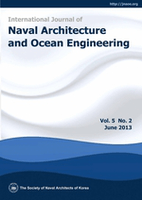
International Journal of Naval Architecture and Ocean Engineering
Scope & Guideline
Shaping the waves of naval architecture with cutting-edge insights.
Introduction
Aims and Scopes
- Ship Design and Optimization:
The journal covers methodologies for optimizing ship hull forms, structures, and systems to improve performance, efficiency, and safety, using computational techniques such as CFD and numerical simulations. - Marine Engineering and Systems:
Research in this area includes the design and analysis of propulsion systems, energy efficiency measures, and the integration of renewable energy solutions in marine vessels. - Hydrodynamics and Fluid-Structure Interaction:
The journal publishes studies on the interactions between water flows and marine structures, including the effects of waves, currents, and underwater explosions on ship performance. - Autonomous and Unmanned Systems:
This scope focuses on the development of technologies for autonomous vessels, including navigation, collision avoidance, and path planning using advanced algorithms and machine learning. - Safety and Risk Assessment:
The journal emphasizes the importance of safety in maritime operations, presenting research on risk assessment, accident prevention, and the resilience of marine structures. - Sustainability and Environmental Impact:
Research addressing the environmental impacts of marine operations, including pollutant emissions, energy consumption, and the use of alternative fuels in shipping.
Trending and Emerging
- Artificial Intelligence and Machine Learning Applications:
There is an increasing trend toward integrating AI and machine learning techniques for optimizing ship design, enhancing navigation systems, and improving predictive maintenance practices. - Digital Twin and Simulation Technologies:
The use of digital twin models for real-time monitoring and simulation of ship performance is on the rise, indicating a shift towards more adaptive and data-driven approaches in naval architecture. - Sustainable and Green Technologies:
Emerging research is focusing on sustainable practices, including the use of alternative fuels and energy-efficient designs, reflecting the maritime industry's push towards reducing its environmental footprint. - Autonomous Maritime Systems:
The rapid development of unmanned surface vehicles and autonomous navigation systems is becoming a central theme, emphasizing the need for innovative solutions in maritime safety and efficiency. - Advanced Materials and Structural Health Monitoring:
Research on new materials for ship construction and real-time structural health monitoring systems is gaining importance, driven by the need for enhanced durability and performance in challenging marine environments.
Declining or Waning
- Traditional Shipbuilding Techniques:
Research related to conventional shipbuilding practices has decreased as more emphasis is placed on modern methodologies and technologies, such as digital twin modeling and automated systems. - Basic Hydrodynamic Theory:
While fundamental hydrodynamic studies are still relevant, there has been a noticeable shift towards more applied and complex scenarios, such as real-time simulations and advanced computational methods. - Static Structural Analysis:
The focus on static analysis of ship structures has waned in favor of dynamic assessments that consider operational conditions and environmental interactions, reflecting a trend toward more holistic evaluations.
Similar Journals
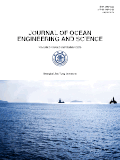
Journal of Ocean Engineering and Science
Exploring innovative research for a sustainable marine future.The Journal of Ocean Engineering and Science, published by Elsevier, is a prominent academic journal dedicated to advancing the field of ocean engineering and environmental sciences. Since its inception as an Open Access journal in 2016, it has rapidly gained recognition, achieving significant impact factor ratings with notable placements in the prestigious Q1 category for Ocean Engineering and Oceanography, and Q2 for Environmental Engineering in 2023. With a remarkable ranking of #3 out of 105 in Ocean Engineering and #4 out of 145 in Oceanography according to Scopus, the journal plays a critical role in disseminating cutting-edge research and innovative solutions addressing complex challenges faced by marine environments. Operating from Amsterdam, Netherlands, the Journal of Ocean Engineering and Science invites contributions from researchers, professionals, and students worldwide, emphasizing the importance of interdisciplinary approaches in achieving sustainable maritime practices.
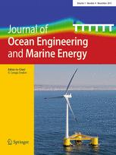
Journal of Ocean Engineering and Marine Energy
Advancing Research for a Greener Marine FutureJournal of Ocean Engineering and Marine Energy, published by SpringerNature, stands at the forefront of interdisciplinary research within the fields of ocean engineering and marine energy. Since its inception in 2015, this journal has aimed to address critical challenges and innovations in energy systems, particularly those harnessed from marine environments, thereby contributing to sustainable development and efficient resource management. With an esteemed Q2 ranking in multiple categories such as Energy Engineering and Power Technology, and Ocean Engineering, the journal serves as a vital platform for researchers, professionals, and students seeking to disseminate and engage with cutting-edge research and technological advancements. Boasting a robust readership and a commitment to open-access principles, the journal fosters a collaborative environment for the exploration of new ideas and approaches in a rapidly evolving sector. By bridging the gap between academia and industry, Journal of Ocean Engineering and Marine Energy remains instrumental in shaping the future of renewable energy solutions and environmental sustainability.

Wind Engineering
Empowering Sustainable Solutions Through Wind Technology.Wind Engineering, published by SAGE PUBLICATIONS LTD, is a premier academic journal dedicated to the field of wind energy, encompassing essential research on the engineering, design, and implementation of wind-related technologies and systems. Since its inception in 1977 and with an impressive convergence until 2024, the journal has made significant contributions to the discourse surrounding Energy Engineering and Renewable Energy. With a commendable impact factor and ranking in the Q2 category in Energy Engineering and Power Technology, as well as Q3 in Renewable Energy, Sustainability and the Environment, it caters to leading researchers and professionals by disseminating high-quality, peer-reviewed articles. Wind Engineering also ranks prominently in Scopus, notably at the 60th and 48th percentiles within its respective categories, reflecting its influence and relevance in fostering innovation in sustainable energy solutions. Although this journal does not feature open access, its rigorous insights reshape the understanding of wind energy applications, making it an essential resource for those engaged in this vital sector.

Journal of Marine Science and Technology-Taiwan
Bridging knowledge and technology in marine environments.The Journal of Marine Science and Technology-Taiwan, published by Nant Taiwan Ocean University, is a pivotal academic platform dedicated to the advancement of knowledge in the fields of marine science and engineering. With an ISSN of 1023-2796 and E-ISSN 2709-6998, this journal spans a wide array of topics relevant to the study and application of marine technology from 1998 to 2024. It ranks in the Q3 quartile in major categories such as Mechanical Engineering, Mechanics of Materials, and Ocean Engineering, illustrating its growing influence and the breadth of research it encompasses. Although currently not an open access journal, it provides critical insights to researchers, professionals, and students alike, making significant contributions to the understanding of marine environments and technologies. As the journal continues to evolve, its commitment to high-quality, impactful research remains central to its mission, empowering scholars to drive innovation in the dynamic field of marine science.
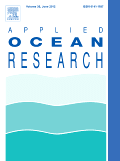
APPLIED OCEAN RESEARCH
Fostering Excellence in Marine Technology ResearchApplied Ocean Research, published by Elsevier Scientific Ltd, stands as a premier journal in the field of ocean engineering, with an impressive impact factor derived from its esteemed reputation and contributions to the discipline. Having been established in 1979, the journal has continually provided a platform for groundbreaking research, fostering innovation and advancement in applied ocean science through a diverse array of topics, including marine technology, coastal engineering, and ocean energy. Currently holding a prestigious Q1 ranking in the Scopus category of Ocean Engineering, with a rank of 10 out of 105 and a notable 90th percentile, Applied Ocean Research is a vital resource for researchers, professionals, and students dedicated to understanding and solving complex challenges linked to ocean environments. Although it provides subscription-based access, the depth and quality of research featured make it a key reference point for those in academia and industry alike. Located in the heart of London, this journal embodies a commitment to excellence in the study of ocean phenomena, positioning itself as a critical conduit for knowledge dissemination and professional growth in this dynamic field.
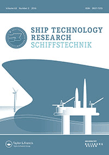
Ship Technology Research
Exploring the depths of ship technology advancements.Ship Technology Research, published by Taylor & Francis Ltd, is a premier journal dedicated to advancing the field of ocean engineering. Established in 1995, this journal provides a critical platform for cutting-edge research, innovative methodologies, and the latest developments in ship technology. With a notable Q2 ranking in the Ocean Engineering category for 2023 and placing in the 70th percentile of Scopus rankings, the journal serves as an essential resource for professionals, researchers, and students aiming to enhance their knowledge and contribute to maritime advancements. The journal not only disseminates high-quality research but also encourages collaboration across disciplines, addressing the real-world challenges faced in ship design, operation, and technology. As a non-open access journal, it continues to uphold rigorous standards, ensuring that published work is both relevant and impactful in fostering innovation in the maritime industry.
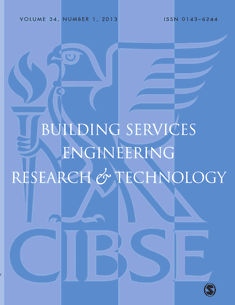
Building Services Engineering Research & Technology
Pioneering Research for a Sustainable Built EnvironmentBuilding Services Engineering Research & Technology is a leading journal published by SAGE Publications Ltd, dedicated to advancing the field of building services engineering. With an ISSN of 0143-6244 and an E-ISSN of 1477-0849, the journal has established itself as a vital resource since its inception in 1980, operating as an essential platform for disseminating high-quality research and technological innovations up to 2024. The journal is well-respected within the academic community, reflected in its Q2 category ranking in Building and Construction and a commendable 67th percentile rank among the 223 journals in its field, according to Scopus. Although it does not offer open access, it provides extensive insights and rigorous studies that are invaluable for researchers, practitioners, and students alike. As a central hub for the exploration of cutting-edge methods and principles in building services, the journal aims to foster a better understanding of sustainable and innovative practices within the industry.
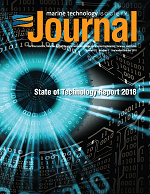
MARINE TECHNOLOGY SOCIETY JOURNAL
Advancing Knowledge in Oceanography and EngineeringMARINE TECHNOLOGY SOCIETY JOURNAL, published by the Marine Technology Society, Inc., serves as a critical forum for advancing the field of marine engineering and oceanography. With a rich history dating back to its inception in 1969 and continuing through various converged years until 2024, this journal is recognized for its contributions to the understanding of marine technologies and their applications. It currently holds a notable Q3 ranking in both Ocean Engineering and Oceanography, as per the 2023 metrics, underscoring its significance in these domains. Although access is not open, the journal rigorously assesses and publishes high-quality research articles, technical notes, and reviews that engage a wide readership of researchers, industry professionals, and students alike. With the journal's aim to disseminate innovative findings and foster dialogue within the marine community, it promises to be an essential resource for anyone looking to explore the dynamic field of marine technology.

International Shipbuilding Progress
Fostering excellence in mechanical and ocean engineering.International Shipbuilding Progress is a distinguished journal dedicated to advancing knowledge in the fields of Mechanical and Ocean Engineering, published by IOS PRESS. With a rich history dating back to 1969 and over four decades of scholarly contributions, this journal serves as a vital platform for researchers, professionals, and students seeking to explore innovative technologies and advancements within the shipbuilding sector. Although it currently does not offer open access options, the journal is held in high regard, reflected by its Q3 ranking in both the Mechanical Engineering and Ocean Engineering categories according to the latest 2023 category quartiles. The journal aims to disseminate high-quality research findings and foster collaboration among experts globally, enhancing the maritime and shipbuilding industries. For those engaged in maritime innovation and engineering, International Shipbuilding Progress is an essential resource for staying abreast of the latest developments and research trends.

AIRCRAFT ENGINEERING AND AEROSPACE TECHNOLOGY
Advancing aerospace innovation through rigorous research.AIRCRAFT ENGINEERING AND AEROSPACE TECHNOLOGY, published by Emerald Group Publishing Ltd, is a leading peer-reviewed journal dedicated to advancing the fields of aerospace engineering and technology. With a strong emphasis on innovative research, the journal aims to bridge theoretical developments and practical applications within the aerospace sector. Although the journal does not currently offer open access, it continues to enrich the academic community's understanding of aircraft design, maintenance, and engineering processes, making it a crucial resource for researchers, professionals, and students alike. By fostering a rigorous dialogue among experts, AIRCRAFT ENGINEERING AND AEROSPACE TECHNOLOGY ensures the dissemination of cutting-edge findings and promotes sustainable practices in the aerospace industry, highlighted by its commitment to high-quality scholarship.